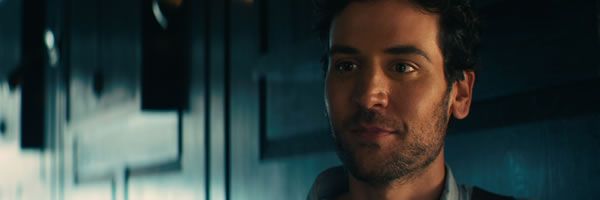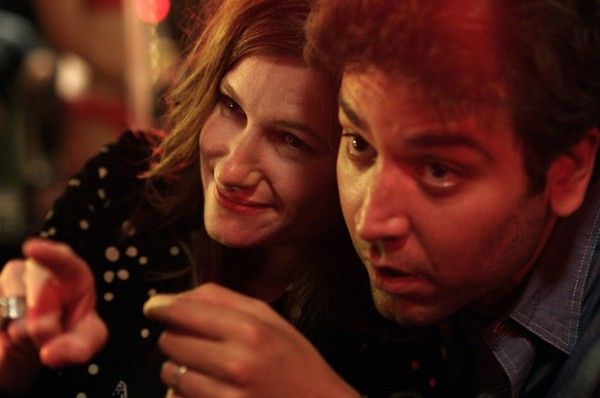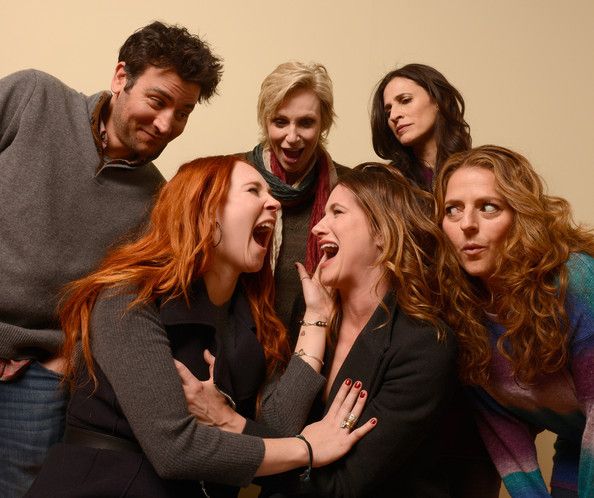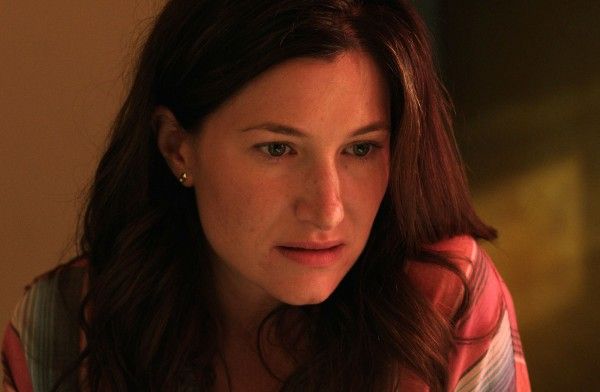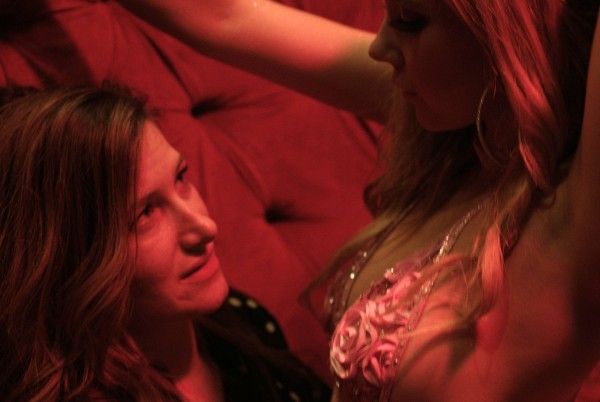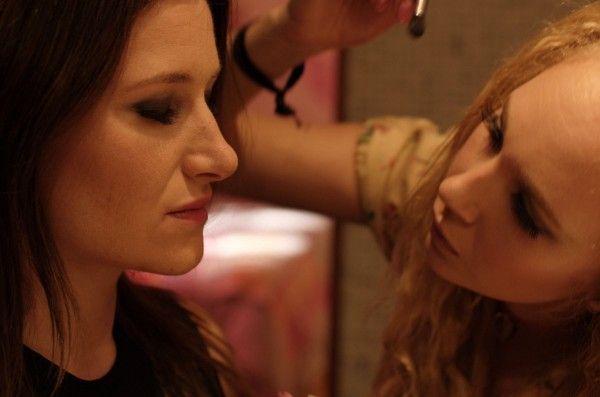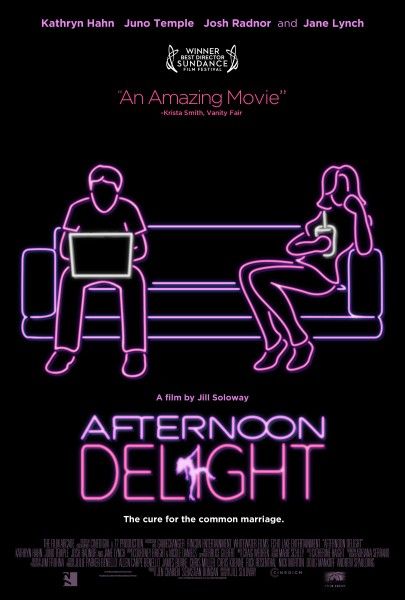From writer/director Jill Soloway, the indie dramedy Afternoon Delight tells the story of Rachel (Kathryn Hahn), an affluent, stay-at-home, thirty-something mom who’s feeling disconnected from her husband (Josh Radnor). When she visits a strip club to spice up her marriage and gets a private lap dance from McKenna (Juno Temple), she soon becomes obsessed with saving her, even going so far as to make her a live-in nanny, which can’t possibly turn out well for anyone involved.
At the film’s press day, actor Josh Radnor spoke to Collider for this exclusive interview about how he came to be a part of this film, how he decides what to do between seasons of his show, what it was like to work with both Kathryn Hahn and Juno Temple, and why he’s so comfortable in a female-dominated environment. He also talked about how it feels to shoot the final season of How I Met Your Mother, after being a part of the show for nearly a decade, how much he knows about the ending, whether he’d cast any of his co-stars in one of his own films, how much he’s learned about filmmaking from directing, and who’s opinions he trusts when it comes to editing his films. Check out what he had to say after the jump.
Collider: How did you come to be a part of this?
JOSH RADNOR: Jill [Soloway] is an old friend of mine. We’ve known each other about six or seven years. She actually called me to ask me to recommend a production designer, and I recommended mine, but she wasn’t available. And she said, “Listen, you’re really perfect for this role. It’s not cast yet, but I didn’t come to you because you’re doing the show and you won’t be able to do it. But, we’re doing a table read next week. Can you read the part?” So, I read the part. It was such a good table read. Kathryn [Hahn] was there, Juno [Temple] was there, and a bunch of other people in the movie were there. After the table read, she was like, “I need you to do this role. What do we do? Let’s figure out a way to do it.” So, I talked to them at work and they worked it out. I did three days a week on the show and four days a week on the movie, for about three weeks. So, I had three seven-day weeks, which was really intense, but the process was so invigorating that I never found it to be completely draining. When you do a long-running show for that long, you know how to conserve your energy. You know how to do it, and you’re in a groove with it, but there are also other muscles that are not getting worked. So, getting to do this, in addition to the show, felt very complete. I just remember feeling very fertile that August. I had a great time doing both at once.
Because you have such a short window between seasons to do other projects in, does that make you very picky?
RADNOR: Certainly. I’ve had to make some tough choices, in terms of where I’m leaning towards, as either a writer/director or an actor. If I want to keep writing, I sometimes really need to use a whole hiatus to write. So, there have been a few summers where I just haven’t done any acting, and I’ve been writing and traveling a lot. I really like to travel when I write. Something about seeing new things and being in new cultures and environments provokes new thoughts in your head. So, I find that to get out of my routine and to get out of my house to be really helpful. It’s clear, in terms of acting stuff and what I’ve chosen to do because of the stories I want to tell. There’s just a lot of stuff I decided not to chance because it didn’t feel like something I could fully throw myself behind. Because I only have a little amount of time anyway, to work every year, I just decided that the most inspiring and growth-inducing thing I could do would be to work on my own projects. But then, something like this comes along where you think, “These are people I love and respect and admire and want to work with, and it feels like something I could throw my full self behind.” I’m always open to those opportunities, as an actor. Maybe you end up working less, but everything you do align yourself with is something you can hopefully be really proud of. You never know how things are gonna turn out. Jill is a first-time director, but also kind of not because she’s run shows before. She was not a set newbie. She’d been on sets and she knew how things worked, and she’s a natural leader. She has the DNA of a director.
What was it like to work with Kathryn Hahn and Juno Temple, who both give very fearless performances in this?
RADNOR: I had a fitting, so I had to go to set after work, one day. They were already shooting, so I watched them shoot the scene where they’re walking and talking and sharing a cigarette. I watched a bunch of takes and I was so impressed with just the level of trust and familiarity they had with each other, but it really felt like they were just getting to know each other. Everything about it felt truthful to me. It was cool. I thought, “Oh, this is a really special thing that I’ve lucked into.” They don’t all turn out well. You never know. You can love a script, but the thing doesn’t turn out well. You can be a little lukewarm on the script, but the project can turn out great. So, it’s always a gamble when you say yes to something. But I just had the feeling, when I watched them, that the bar was set high. You want to be in a project where all guns are firing and you’re giving it your all and you’re throwing yourself into it with some kind of abandon, and that’s what it felt like with this.
All of the characters in this film are very emotionally vulnerable. Are you comfortable in that place, as an actor?
RADNOR: I feel comfortable with women. I have two sisters, so I grew up in a female-dominated environment. I was never in a fraternity, or anything. I always got uncomfortable when there were no women around. I don’t love large groups of men. I’ve always felt like something terrible could happen when there were no women. If there are women around, it feels like there’s less of a chance that anyone will get stabbed. So, to have an environment where a strong female presence was our leader, she really created a space where you felt safe. Even if it wasn’t the take she would use, you never felt like you did something wrong. Everything felt like a right move. There was only one scene that we weren’t quite getting, and we ended up re-shooting it. It was the scene where they light the candles in the garage, and it was just a matter of finding a different way to approach it than had been in the original draft. What we found, I think, was really perfect and I’m really proud of that scene now. Everything just felt really safe. Every move you were making felt appropriate because she just created a container where actors could do their best work.
How does it feel to know that you’re in the final season of How I Met Your Mother? Does it feel anything like you expected it to?
RADNOR: It’s been really good and weird. Before the season started, we had dinner and the creators, Carter [Bays] and Craig [Thomas], told me that it was such a strange thing to find themselves in the ninth season of a show and feel so creatively inspired. They just hit on some ideas that they really just got jazzed to tell, from a new way. It’s still How I Met Your Mother, for sure. It zips all across time, backwards and forwards. It still does that funky narrative stuff that the show is so great at, but it’s also more concentrated. Also, because you have eight seasons of a tidal wave of narrative behind our backs, there’s so much history informing the characters now that there are so many more avenues to go to, in terms of both more dramatic stuff and comedic stuff. We’ve done five episodes, and I think they’re as good and as strong as any episodes we’ve done. And then, there’s the other thing of just being on set and knowing it’s out last time. I remember I was cutting through to my dressing room and I cut through the bar. We’re not using the bar set as much. We go back to it a bunch, but we’re not there the way we have been, throughout the whole series. And I just had this moment of being in the bar when no one was there and feeling like, “Wow, this was a powerful time in all our lives.” It’s certainly changed everyone’s life, in so many ways, and everyone’s life changed while they were doing it. I had this moment that almost felt like walking into an empty church. Not to overstate it, but it was really beautiful.
Is everybody owning that it’s the last season, or is everybody still in denial?
RADNOR: I think there’s something you can’t quite escape about the fact that it’s the last season. Even though everyone loves the experience and recognizes how transformative it’s been and what a gift it’s been, you don’t want to do it forever. It’s just a long time to stay with one character. We’re as popular as we’ve ever been, so we’re not one of those shows that dwindled in quality or overstayed its welcome. So, I feel like there’s a sense that it’s totally time to end. We’ll be happy when it ends, but also inconsolable. I think there’s going to be a grieving that goes on, just because of the transition into not having that be the main part of your year, with those people. And it’s not just five people. It’s 100 people. It’s people that we’ve really grown to love. We know their families. There have been births and deaths. It will be almost a decade. On the first table read, I remember thinking, “Oh, this is the last first day.” And then, at the holiday party, I was like, “Oh, this is out last Christmas party.” Everything is the last, but that’s okay. One of the secrets to life is saying yes to change and allowing things to transition, but I also think you have to mark the time and give thanks for all that it gave you.
Do you know how the show will end?
RADNOR: Not entirely. They’ve told me some of the arcs of this season. The narrative character knows everything. Whether or not he’s a reliable narrator is a question for PhD students to hash out in their thesis about How I Met Your Mother. But, the character that I play doesn’t have all that information. He’s playing it forward. It’s helped me to have more naivete about what’s about to happen. I just get the scripts a few days before. In some ways, I’m a fan of the show, but I just get to know what happens before the rest of the world.
Do you want to go straight into shooting something else, or do you want to have a mourning period?
RADNOR: That’s interesting. I don’t know. I think a lot of that will be dependent on timing and financing, and how quickly the next thing comes together. I do have something that I’m finishing now, that I hope to have on deck, but I don’t know. There are so many variables, in terms of when you can shoot. I think some mourning would be not inappropriate. I’m really grateful to do the show. I’m happy doing the show. I also get really happy not doing the show. It’s win-win. When I’m working, it’s great. When I’m not working, it’s great.
Now that you’re writing and making your own films, have you thought about writing a role for any one of your How I Met Your Mother co-stars?
RADNOR: I haven’t really thought about that, just because we’re around each other, all the time. It’s almost like you’re looking for different opportunities when you have that time away from the show. Certainly, down the line, I would not object, if the right thing came along, to getting the old gang back together. If one of those people was right for one of my movies, I wouldn’t hesitate to cast them. I don’t know if I would want to be in it because it would evoke too much of that history. You have to be careful about that. But, I certainly have nothing but respect for the talent of my castmates. At table reads, I notice it the most because we’re all together, all at the same time. Everyone is so great, at this point, at playing those roles, and everyone just knows what they’re doing. You couldn’t imagine anyone else doing it.
Do you find yourself paying attention to things differently on set, now that you’re directing your own stuff?
RADNOR: It’s such a different beast, the single-camera movie world and the multi-cam comedy world. For some reason, I’ve been able to separate them out in my head, and I don’t collapse them. The biggest thing for me, in terms of learning from a director, was Pam Fryman, who directs every episode of the show. There’s no better example of a captain of a ship. Her leadership skills are so deft. She leads with a strength, but sweetness. I’ve never responded to dictators, and she’s the opposite of one. I learned very quickly that you can absolutely get the best work out of people without being a tyrant, so I took that, certainly.
Do you feel that you’ve learned more about filmmaking from actually making your own films, or being in other people’s films and watching what they do?
RADNOR: From making my own films. I think there’s no greater film school than making a film. And having made two films, you get your 10,000 hours. I don’t know how much 10,000 hours is, but if you include everything from the writing of it to the casting of it to the shooting of it to the editing and all the post, then that’s a lot. I didn’t actually know that much about filmmaking, sadly. I knew, as an actor, how to write scenes that would be compelling to watch and to act. And then, with my second film, I was thinking more as a director and I think you can see a difference in some of that. The film I’m writing now, I’m actually thinking as a producer, as well as a director. I’m thinking, “Well, this could be one location instead of two, and that could help our day. There really is no point to move locations, if we don’t have to.”
So, my film school is making movies. But, I do think that being an actor has served me immensely, as both a writer and director, in terms of knowing what is playable and what will be fun to play, for actors, and also how to communicate to actors on set, and not screw them up and get them in their head. You need to say certain things to one kind of actor, and nothing to another actor. You really have to assess who you’re dealing with and figure out how to get the best work out of them. One thing I’m most proud of, in my movies, is that I think the performances are super-strong, but that’s not all me. I think part of it is casting appropriately. Because I wrote the role, I have a sense of who, genetically and cellularly, is appropriate for a role. Also, it’s about knowing how to gently guide someone. But, if you’re casting super-smart actors who are open to the process, you’re not going to have any problem collaborating with them. And they want you to make them look the best that they can. I don’t think any of the actors in my movies have been like, “How could you choose that take?” I’m very clear about why I’m choosing something.
But, the whole process is super-exciting to me, and not just talking to actors. I’ve really fallen hard for being in the editing room. That process is so exciting to me. I love the sound mix. I love color correction. I love the whole stew of it. I didn’t know anything about that, but it’s almost like, “Oh, man, I want to shoot another film, so that I can get back in the editing room.”
Do you ever find it difficult to let go of scenes, or are you good with that?
RADNOR: I’m getting better at that. A director named Andrew Wagner told me something really get, at the start of happythankyoumoreplease, when I was terrified and didn’t know what was gonna happen. He said, “Don’t shoot the film that’s in your head, that you think is the film that you wanna make. Shoot the film that’s in front of you, that’s asking to be shot.” There are so many other elements that come on board, after you’ve written the film and once the film starts to take shape as an actual thing that’s going to be made. You also have to allow for the fact that your cinematographer is going to have some better ideas than you had, and your production designer is going to make the spaces look much more interesting. All these different people are there to assist you and really up your game and collaborate with you. Quentin Tarantino said that when he was terrified of directing, someone said, “You don’t have to know how to do everything. You hire people who know how to do all those things. All you have to do is hold your vision of the movie and be able to articulate what that vision is.” That’s something I feel really strong about.
I don’t always have solutions to everything. Sometimes the actor will come up with a solution. We ran out of time for a shot on happythankyoumoreplease that I really thought was going to be a cool shot. We simply did not have time for it. We had time for one shot. And my first A.D. came up with an idea for a shot that told the story better than the other shot would have, so we shot it that way and it’s one of my favorite shots in the movie, just because it was such an elegant solution. A lot of times, movie-making is just problem solving. It’s just that there are 150 problems a day and you have to come up with a solution for them. You just put one foot in front of the other, and deal with one problem after another. And then, at the end of the day, you’ve got everything.
Because the films you’ve made have been smaller character pieces, do you still do some sort of a test screening process?
RADNOR: I don’t think it would be wise to make a film without trying to get as many opinions as you could. Now, that doesn’t mean showing it to everyone. Not all opinions are equal. I certainly haven’t had money to do hundreds and hundreds of people at various test screenings. That’s not what we do. But, I’ve certainly done a lot of friends and family screenings. I always do that. Just because a movie makes sense to me, it doesn’t mean it makes sense to a first-time viewer. I want to know where my blind spots are, what doesn’t make sense, what is over-explained. You start to hear consistent opinions about certain things. So, when you realize that there is a unanimity of opinion around one or two or three elements, you have to address it. I have a friend who is a professor at New York Film Academy, so for both films, I screened there, for their students, and then I did a little Q&A afterwards. That’s been a really nice thing, to get people that you don’t know because you’re not sure if people are just telling you what you want to hear. But, I’m much tougher on myself than I thought I would be. I’m much more ruthless with editing. I’ve cut 45 minutes out of both of my films, of shot and edited material, so I have no problem letting things go, and I thought I would. I thought I’d be really precious, but I haven’t been. I cut a whole plotline from Liberal Arts. There was this whole thing with his friend back in New York that just didn’t end up in the movie. It actually served the movie because it made Jesse seems a little more isolated, back in New York. You thought, “Oh, this guy really is a little sad and lonely.” I thought I needed it, but I ended up not needing it.
Afternoon Delight is now playing in theaters.

